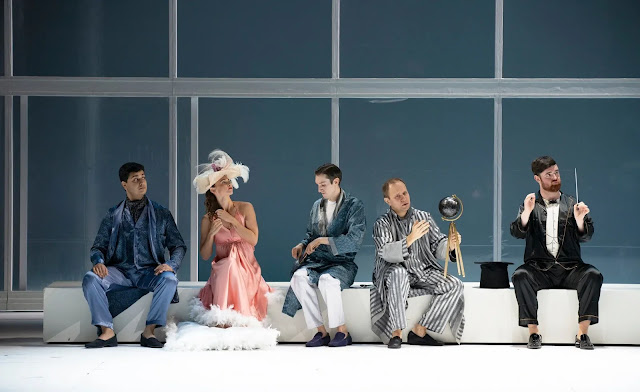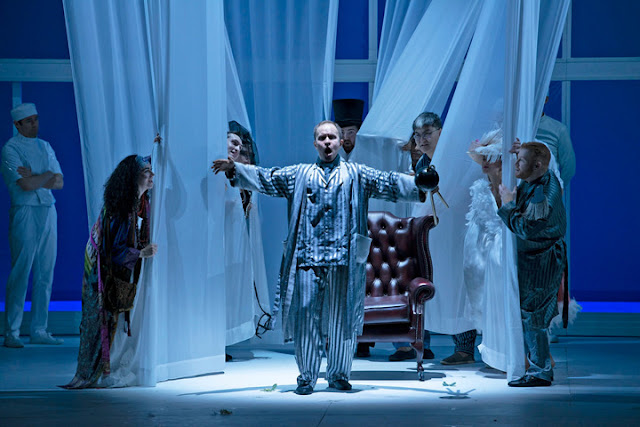 |
| Rossini: Il viaggio a Reims – Wexford Festival Opera (Photo: Pádraig Grant) |
Rossini’s Il viaggio a Reims; Wexford Factory, director Rosetta Cucchi, conductor Manuel Hartinger, Wexford Festival Opera; National Opera House
Reviewed 31 October 2025
A brilliant showcase for the young artists of the Wexford Factory who dazzled and engaged in Rossini’s showpiece music, though transferring the action to an insane asylum felt in doubtful taste
Rossini’s Il viaggio a Reims was an occasional piece, not so much because of the references to Charles X’s coronation in Rheims to which the opera refers, but because the occasion drew forth a cast of 14 distinguished soloists including Giuditta Pasta (for whom Bellini wrote the title roles in La sonnambula and Norma) and Laure Cinti-Damoreau (who would premiere several of Rossini’s French operas).
Since the work’s modern premiere at the Rossini Festival in Pesaro in 1984, the piece has become more common on stages as something of a party piece, with recent UK performances including at Covent Garden (as a showcase for the Jette Parker Young Artists) and more recently at English Touring Opera [see my review]. These performances demonstrated that the work does have a plot and that it works in situations divorced from the original proceedings.
At this year’s Wexford Festival Opera, Rossini’s Il viaggio a Reims was chosen as a showcase for the Wexford Factory young artists and to celebrate the 200th anniversary of the work’s premiere. The work was performed in an orchestral reduction by the conductor Manuel Hartinger that used around 14 instruments (plus on-stage flute and harp). I caught the final of a series of morning performances at the National Opera House on Friday 31 October 2025. The production was directed by Rosetta Cucchi, the festival’s artistic director, with costumes by Massimo Carlotto and lighting by Paolo Bonnapace.
The cast was made up of singers from the Wexford Factory, with five roles being double cast, and from the festival chorus – Maria Matthews, Cerys MacAllister, Laure Aherne, Valeriia Gobunova, Gabe Clarke, Sean Tester, Aqshin Khudaverdiyev, Ihor Mostovoi, Seamus Brady, Tong Guo, Joshua McCullough, Conor Prendeville, Rory Lynch, Meilir Jones and Loughlin Deegan.
 |
| Rossini: Il viaggio a Reims – Wexford Festival Opera (Photo: Pádraig Grant) |
Perhaps because the performance had originally been planned as a semi-staging, though there was in fact nothing semi about it, Cucchi chose to reject the original scenario and set the opera in an asylum. As Cucchi explains in the programme book, ‘a whimsical asylum, where each aristocrat becomes a lovable patient, each with his own delightful obsession’. Whilst she claims that the production is not ‘mocking illness’ there was something a little uncomfortable about watching these various obsessives.
Some elements were straight out of a bad 1960s film comedy. Joshua McCullough’s Don Prudenzio, the doctor, was effectively blind, mixed up the patients pills and McCullough had to spend much of the opera indulging in bad blind man jokes. Maria Matthews’ Madama Cortese had a terrible compulsive twitch that was just plain embarrassing in the context of the modern understanding of mental illness.
The remainder of the asylum patients were portrayed as harmless eccentrics. Certainly we can laugh at Contessa di Folleville and Jane Burnell’s way her grand scena was stylish in the grand manner, yet all this over a hat. That is the point. We laugh because the Contessa is taking a trivial loss entirely seriously, and expressing herself in classic Rossinian opera seria. If we are being asked to laugh at the Contessa because she is a harmless eccentric, surely this weakens things.
The various fights and swoonings were each individually staged, very much like a concert yet the libretto does enable us to link these together and create a sort of plot. That did not really happen. Also, Luigi Balocchi’s libretto uses an old-fashioned piece of short-hand to enable his audience to get a handle on who all these people are. Each of the main characters is a different nationality and they have national characteristics. Yes, it is lazy and reductive, as well as being borderline racist, but in the context of an opera with a dozen major characters, this broad brush approach is helpful.
Here it was harder to work out who was whom, particularly amongst the men. When Aqshin Khudaverdiyev’s Lord Sidney had his big scene where he is hoping to woo Corinna the poetess, the object of his affections was not clear as the scene was done more as a stand-alone scena complete with on-stage flautist. This use of on-stage instruments was an imaginative touch and both of Laura Aherne’s big arias as Corinna included an on-stage harp.
All the singers were impressive in their grasp of technique and style. The ones that stood out were those where the music took them more to the edge. Both tenors were impressive in their way with Gabe Clarke as a finely lyrical Cavalier Belfiore for whom Rossinian fioriture held no terrors, whilst Sean Tester’s more vibrantly heroic sound was positively thrilling when Conte di Libenskof’s part took him high above the stave. Ihor Mostovoi as Don Profundo turned in a dazzling line in patter as his character listed all the other characters’ belongings at breakneck speed. Valeriia Gorbunova made a delightful Marchese Melibea, with Gorbunova singing Rossini’s passagework with great relish. Both Tester and Gorbunova are singers I would love to hear in some of Rossini’s more testing operas. And a special credit to the male member of the ensemble playing one of the orderlies who managed to perform the entire opera with a cigarette in his mouth!
Musically there was much to delight in the performance and all the singers were clearly enjoying themselves and there was a lovely exuberance to the performance, if you could only get past the unfortunate insane asylum antics. The great set piece, the big ensemble that closes Act Two, was staged simply which meant that it was all the more musically effective. This is one of those remarkable moments in opera and well worth encountering the work for,
Manuel Hartinger’s reduction worked very well. Though there was a slight over-reliance on vamp-til-ready type keyboard figuration, many of the arias worked well and we did not feel short changed, with fine playing from members of the Wexford Festival Orchestra.
The blog is free, but I’d be delighted if you were to show your appreciation by buying me a coffee.
Elsewhere on this blog
- Deidamia: a welcome chance to catch Handel’s final Italian opera in Wexford, though the production feels a little self-indulgent – review
- Different musical accents: Le Trouvère, Verdi’s French revision of Il trovatore receives a rare outing in Wexford – opera review
- There was no closure here: four Irish women composers give voice to women of the Magdalene Laundries in Oxford – concert review
- Lyric beauty & great storytelling: tenor Hugo Brady & pianist Mark Rogers in Moore’s Melodies at Oxford International Song Festival – concert review
- Baba Yaga: Songs and Dances of Death: Rowan Hellier pushes boundaries with music theatre exploring a figure from Slavic folklore – review
- Focus on Shostakovich: tenor Oliver Johnston’s fearlessness & speaker Philip Ross Bullock in engaging form in Oxford – concert review
- Valentin Berlinsky: marking the centenary of founder and cellist of the Borodin String Quartet – concert review
- Thinking about sound: Grieg’s Lyric Pieces on a modern piano from Alexander Ullmann & on historic pianos with unequal temperament from Ziad Kreidy – record review
- Favourite songs & last words: Schubert weekend in Oxford with Nikola Hillebrand, Julius Drake, Thomas Oliemans & Paolo Giacometti – review
- Home









